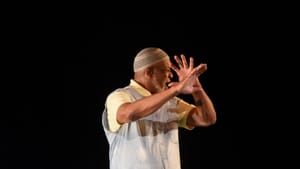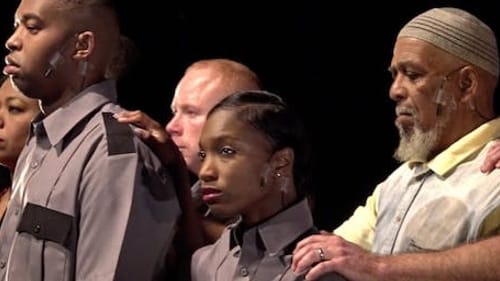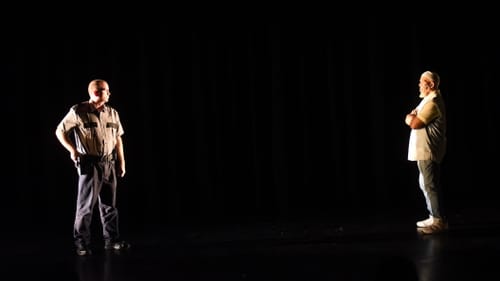Stay in the Loop
BSR publishes on a weekly schedule, with an email newsletter every Wednesday and Thursday morning. There’s no paywall, and subscribing is always free.
Listen and learn
Theater of Witness presents 'Walk in My Shoes'

Theater of Witness’s film Walk in My Shoes opens with a tableau of tension: four uniformed Philadelphia police officers and three community members regard each other from a wary distance. Their postures are tight, their faces grim.
Moments later in this fierce, unflinching work, based on a live production that premiered in 2017 at the Painted Bride Arts Center, the screen fills with the image of one of those community members: a black man in a knitted skullcap, telling a story.
Hakim Ali’s face and hands limn anguish as he talks about his father, who was raised in a sharecropping family in Georgia, and about a light-skinned cousin who went missing. When the young man was found, Ali says, “He was hanging from a tree in the woods. He’d been shot. He’d been castrated.”
As Ali’s father described the violence that followed, “I could see in his tears that our family history was still coursing through his veins… The rage I felt sent me down my own road of destruction.” That would include 45 years in and out of prison.
Ali’s story is a potent prologue, reminding us that racism, brutality and grief are wound deeply into our nation’s DNA — and that we cannot dismiss a single person without knowing his or her full story.
Testimonial performance
That’s the point of Theater of Witness, a form of testimonial performance developed by activist/artist Teya Sepinuck, who is trained in dance and counseling. For 30 years, she has ventured into marginalized communities with faith that when people — including immigrants, elders with dementia, teenage runaways, and survivors of war or domestic abuse — share their stories and listen deeply, they can “see love grow from otherness.”
Creating films of the productions extends their life and reach; Sepinuck and her coproducer, Philadelphia Police inspector Altovise Love-Craighead, hope to take Walk in My Shoes, along with follow-up workshops, to a range of community venues. And while a movie can’t replicate the raw urgency of live performance, deft camerawork and editing add texture to the performers’ aching stories.

Sometimes the camera zooms in close, so we cannot blink away from the tear-marked face of Cambodian-born Sophie Heng describing the death of her 19-year-old son, who vanished in April 2016. Then, the lens draws back to show other performers pacing indifferently around Heng as she calls out, “Phillip, where are you? Where are you?” His body was later found in the Schuylkill River.
“Sometimes I think the lives of black and brown boys don’t matter to anyone,” Heng says. “The pain will never go away. I don’t want it to go away. I want to use it to advocate for change.”
Between bullet and bone
The police officers’ monologues are no less riveting. A steady lens captures the agitation of Iraq War veteran William Kozlowski, jogging incessantly as he tries to outrun memories of a buddy killed in a landmine explosion.
Matt York, another white officer, remembers “one moment when I almost pulled the trigger. In that one second, it could have gone the other way.” And Michelle Long’s voice quavers as she describes the younger brother who died—one more black man killed by gun violence—in her arms. “I was a police officer, and the one person I couldn’t save was my brother,” she says.

Trauma—rooted in poverty, racism and war—courses through each story. Cops talk of fear and helplessness in the face of violence that feels “bigger than all of us.” Reuben Jones describes being pulled over for “driving while black” and hearing his six-year-old son cry out, “Daddy, are they gonna kill you?”
“America is broken. I’m broken. You’re broken. My people are broken,” Jones says. And yet. “In music,” he continues, “there’s a breath between notes. In life, a pause before pulling the trigger. In that space, that’s where all possibilities lie.”
In an earlier scene, performers clutched their throats while repeating the words gasped by Eric Garner, a black man who died in 2014 after a New York police officer put him in a chokehold: “I can’t breathe.” The film returns to that phrase as one character asks, “Can life be breathed back into the systemic wounds of our country?” and the entire cast utters an audible exhale.
If this were Hollywood, the film might end with a scene of tearful, redemptive embrace. But as Love-Craighead noted before the screening, these are “real people, real stories.” In one of the movie’s final moments, the seven performers stand with hands on one another’s shoulders, looking soberly, expectantly, in the same direction. At us.
At last Friday’s screening, “us” included some powerful decision-makers: U.S. Representative Dwight Evans, District Attorney Larry Krasner, and Court of Common Pleas Judge Lisa Rau, along with a handful of Philadelphia police officers. I'd like to see Walk in My Shoes become required viewing for every legislator, judge, and police recruit in the country—for all of us, really. Its message is essential in these fractious times: once we have walked in another’s shoes, we cannot simply walk away.
What, When, Where
Walk in My Shoes. By Theater of Witness, Teya Sepinuck directed. November 9, 2018, at Jefferson University, 1020 Locust Street, Philadelphia. To schedule a screening or purchase the film, contact Theater of Witness of CultureTrust Greater Philadelphia, theaterofwitness.org.
Sign up for our newsletter
All of the week's new articles, all in one place. Sign up for the free weekly BSR newsletters, and don't miss a conversation.
 Anndee Hochman
Anndee Hochman